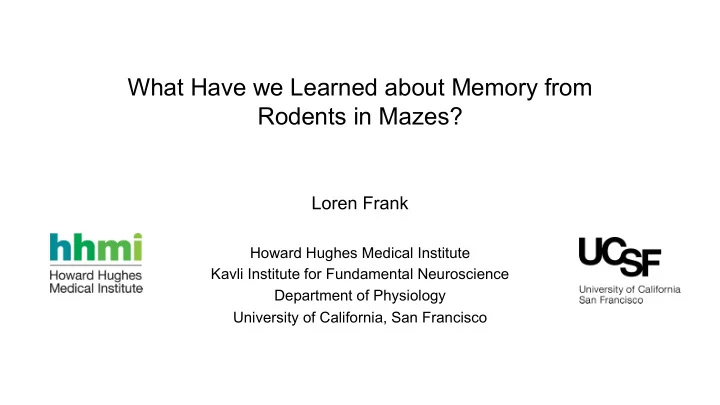

What Have we Learned about Memory from Rodents in Mazes? Loren Frank Howard Hughes Medical Institute Kavli Institute for Fundamental Neuroscience Department of Physiology University of California, San Francisco
Why Build a Model of the World?
Conclusions • The same systems represent current experience and past / future experience. • Representations can cycle between present and future. • Memories engage links between specific and general knowledge.
Hippocampal (CA1) Neural Activity Cell number
Awake Replay of Remote Experiences During Sharp-Wave Ripple Events E1 Sharp-Wave Ripple Place Fields 8 … … E1 “Replay” 14 3 15 2 1 16 Decoding Karlsson and Frank, Nature Neuroscience ( 2009)
Representations of Possible Future Paths Sharp-Wave Ripple Actual Location Decoded and Trajectory Trajectory Is this a memory? Or a plan? Karlsson and Frank, Nature Neuroscience ( 2009)
Alternating Representations of Future Possibilities ”Theta sequences”: Clusterless decoding method: Skaggs et. al. (1996) Deng et. al. Neural Computation (2015) Work from Colgin, Foster and Redish labs.
Conclusions • The same systems represent current experience and past / future experience. • Representations can cycle between present and future. • Memories engage links between specific and general knowledge.
Hippocampal and Prefrontal (PFC) Contributions to Memory • The hippocampus is critical for storing memories for specific events. • For these memories to be useful, the specifics need to be linked to general knowledge structures (”schema”). – The PFC is known to be important for learning and using schema. • How these links manifest in neural activity remains unknown.
Specific and Reliable Representations in Hippocampus
Heterogeneous Representations in PFC
Heterogeneous Representations in PFC
Contrasting Representations in Hippocampus and PFC
Preferential Reactivation of PFC Cells with High Reliability and Similarity Reactivated during MAP SWRs Not reactivated during MAP SWRs
Preferential Reactivation of PFC Cells with High Reliability and Similarity
Many-to-One Mapping from MAP to PFC Cells
Conclusions • The same systems represent current experience and past / future experience. • Representations can cycle between present and future. • Memories engage links between specific and general knowledge.
Recommend
More recommend